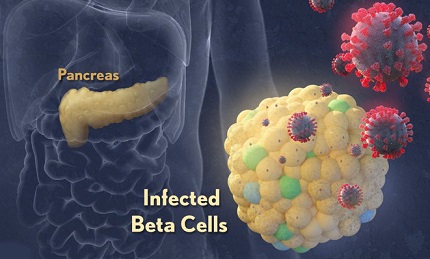Nikhil Prasad Fact checked by:Thailand Medical News Team Apr 14, 2024 1 year, 1 week, 5 days, 9 hours, 38 minutes ago
COVID-19 News: The COVID-19 pandemic, stemming from the novel coronavirus SARS-CoV-2, has led to a global health crisis characterized not only by respiratory complications but also by a myriad of multi-organ manifestations. Among these, emerging evidence suggests a potential link between COVID-19 infections and pancreatic impairment, raising concerns about glycometabolic dysfunction and the heightened risk of diabetes development. Understanding these complex associations is crucial for comprehensive patient management and the development of targeted interventions. In this
COVID-19 News report, we delve into a detailed study conducted by the Chinese Academy of Medical Sciences and Comparative Medicine Center, Peking Union Medical College in Beijing, China. This study provides a comprehensive exploration of the relationship between COVID-19 infections, pancreatic health, and glycemic disturbances, shedding light on crucial insights that have significant implications for public health strategies.
 COVID-19 Infections Causes Pancreatic Impairment
Thailand Medical
COVID-19 Infections Causes Pancreatic Impairment
Thailand Medical News had covered previous studies that showed that SARS-CoV-2 could infect the pancreas and also could various pancreatic issues.
https://www.thailandmedical.news/news/warning-incidences-of-acute-pancreatitis-as-a-result-of-sars-cov-2-infections-rising
https://www.thailandmedical.news/news/breaking-sars-cov-2-directly-infects-the-pancreatic-islets-and-causes-pancreatic-inflammation-that-can-lead-to-post-covid-hyperglycemia-and-other-issu
https://www.thailandmedical.news/news/coronavirus-news-cedars-sinai-medical-center-study-confirms-that-the-sars-cov-2-virus-infects-the-pancreas-directly
https://www.thailandmedical.news/news/breaking-more-emerging-chinese-research-studies-shows-that-the-sars-cov-2-coronavirus-also-attacks-the-kidneys,-pancreas-and-liver
https://www.thailandmedical.news/news/acute-pancreatitis-warning-that-acute-pancreatitis-is-now-manifesting-in-covid-19-patients,-a-condition-never-seen-in-early-stages-of-the-pandemic
&
lt;br />
The Context: COVID-19 and Pancreatic Health
The preliminary segments of the study findings underscore the evolving understanding of the intricate relationship between COVID-19 infections and pancreatic health. Clinical observations have revealed that individuals with preexisting diabetes are particularly vulnerable to severe outcomes following COVID-19 infections. Moreover, experimental data from laboratory models and in vivo studies have highlighted the potential for direct infiltration of SARS-CoV-2 into pancreatic cells, both exocrine and endocrine, adding a layer of complexity to the disease's systemic impact. Despite these insights, questions remain regarding the persistence and age-related variations of pancreatic lesions induced by COVID-19 infections or vaccines, necessitating a more comprehensive investigative approach.
Investigative Approach and Methodologies
To unravel the nuanced dynamics between COVID-19 infections, pancreatic health, and glycemic alterations, the study employed a multifaceted approach. This included retrospective analyses of autopsy tissues from non-human primate (NHP) models infected with SARS-CoV-2, alongside data from vaccinated and infected NHPs and human COVID-19 patients. Cutting-edge techniques such as multi-label immunofluorescence were utilized to assess direct viral infection in pancreatic cells, offering detailed insights into the cellular and molecular mechanisms at play. Systemic proteomics and metabolomics analyses provided a holistic view of metabolic disturbances, particularly focusing on insulin resistance pathways and glycometabolic dysfunction. The inclusion of control groups and comparisons across different age groups added depth and reliability to the investigations, ensuring robust and meaningful conclusions.
Key Findings
The study's findings are structured into distinct categories, each offering crucial insights into the observed phenomena:
-Direct Infection and Pancreatic Phenotypic Changes: The study unequivocally confirms the direct infection of pancreatic cells by SARS-CoV-2, encompassing both exocrine and endocrine components. While adult NHPs exhibited minor phenotypic changes in pancreatic health, elder NHPs displayed more pronounced pancreatic lesions, including beta cell loss and alterations in insulin expression. This differential impact across age groups underscores the age-related susceptibility to COVID-19-induced pancreatic impairment.
-Metabolic Disturbances: The systemic analyses conducted as part of the study unveiled significant metabolic disorders, particularly emphasizing insulin resistance pathways in infected adult NHPs. Elderly NHPs, on the other hand, showcased aggravated glycometabolic dysfunction, indicating age as a critical factor in post-COVID-19 diabetes risk. These findings underscore the intricate interplay between viral infection, metabolic pathways, and age-related vulnerabilities.
Discussion and Interpretation
The discussion segment delves into the nuanced pathophysiological mechanisms underlying COVID-19-induced pancreatic impairment. It explores factors such as direct viral effects on beta cells, inflammatory responses triggering pancreatic stress, amyloidosis, and fibrosis, all of which contribute to glycemic dysregulation and diabetes-like phenotypes. The age-dependent severity of pancreatic lesions and metabolic dysfunction underscores the importance of age-specific considerations in COVID-19 management, emphasizing the need for tailored approaches in vulnerable populations.
Limitations and Future Directions
While the study provides invaluable insights, it is essential to acknowledge its limitations. Variations in sample sizes and the focus on short-term impacts necessitate further longitudinal studies to unravel the long-term effects of COVID-19 on pancreatic health. Future research directions could include investigations into recurrent infections, deeper molecular analyses, and the exploration of potential therapeutic interventions targeting COVID-19-induced metabolic disturbances. These avenues would enhance our understanding and pave the way for more effective clinical strategies.
Conclusion
In conclusion, the study presents a comprehensive exploration of the intricate relationship between COVID-19 infections, pancreatic health, and glycemic alterations. The findings underscore the age-related susceptibility to COVID-19-induced pancreatic impairment and highlight the protective role of vaccines in maintaining metabolic homeostasis. These insights carry significant implications for public health strategies, emphasizing the need for holistic patient management approaches that encompass not only respiratory complications but also metabolic health considerations in the context of COVID-19. Moving forward, continued research efforts and targeted interventions will be crucial in mitigating the broader health impacts of the ongoing pandemic.
The study findings were published in the peer reviewed journal: Signal Transduction and Targeted Therapy (Nature).
https://www.nature.com/articles/s41392-024-01796-2
For the latest
COVID-19 News, keep on logging to Thailand Medical News.
Read Also:
https://www.thailandmedical.news/news/2021-peer-reviewed-study-warning-that-covid-19-can-lead-to-pancreatic-adenocarcinoma-seems-to-be-holding-true-as-pancreatic-cancer-cases-rise
https://www.thailandmedical.news/news/covid-19-news-sars-cov-2-is-likely-an-oncogenic-virus-that-will-cause-lung,-colorectal,-oral,-pancreatic-and-breast-cancers-in-the-long-term
https://www.thailandmedical.news/news/scientists-at-odds-on-what-s-causing-diabetes-in-covid-19-patients-as-two-studies-show-that-ace-2-is-not-expressed-in-pancreatic-beta-cells
https://www.thailandmedical.news/news/breaking-diabetes-and-covid-19-german-case-study--confirms-that-sars-cov-2-can-trigger-diabetes-in-young--adults-otherwise-healthy
https://www.thailandmedical.news/news/breaking-medical-experts-warn-that-covid-19-could-trigger-diabetes-in-otherwise-healthy-individuals-who-never-had-the-condition-before-
https://www.thailandmedical.news/news/covid-19-research-cases-of-covid-19-patients-developing-diabetes-for-first-time-can-be-due-to-high-ace2-expression-in-pancreatic-islet-cells-during-in
